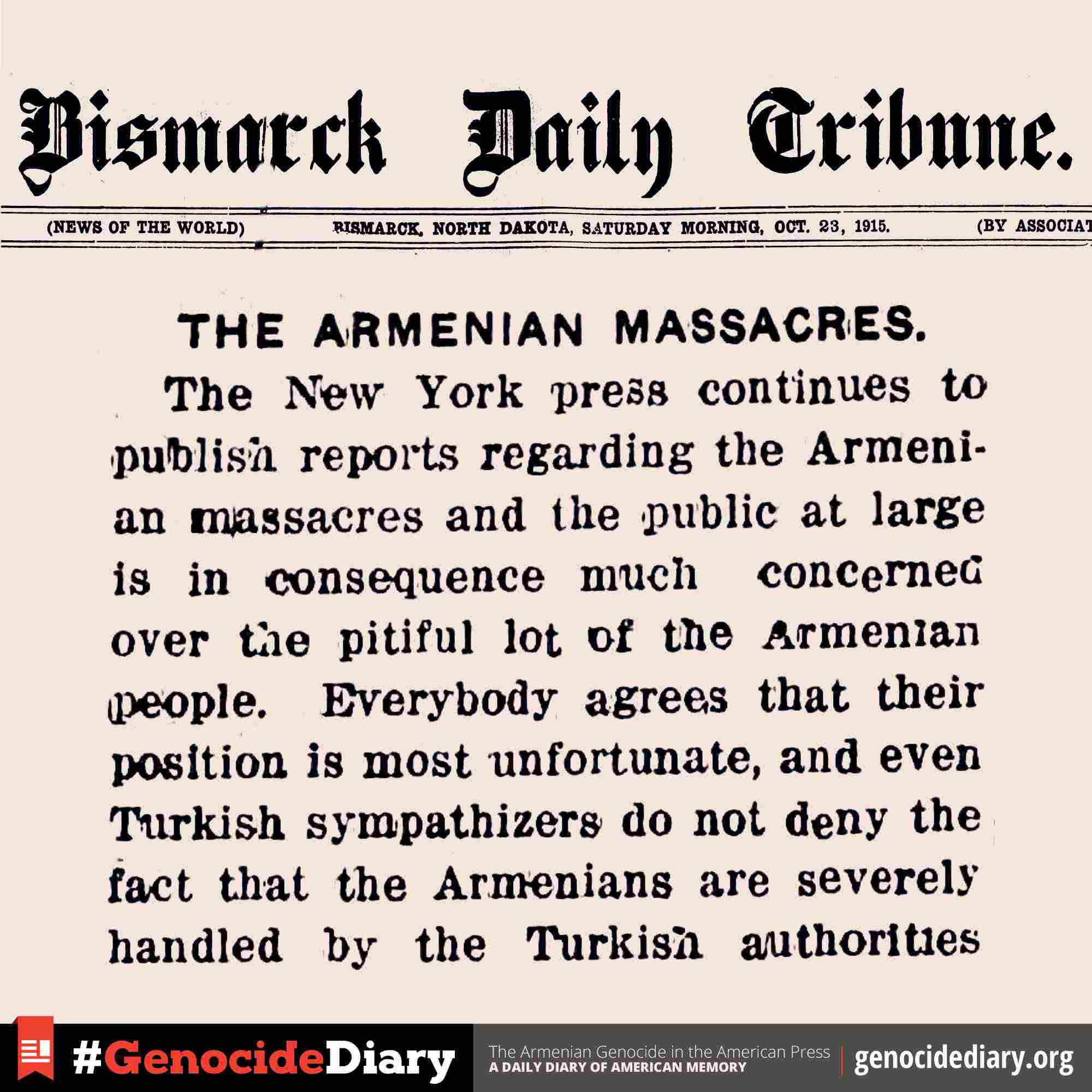The Armenian Massacres
- DATE 23 Oct , 1915
- POSTED IN North Dakota, United States
The New York press continues to publish reports regarding the Armenian massacres and the public at large is in consequence much concerned over the pitiful lot of the Armenian people. Everybody agrees that their position is most unfortunate, and even Turkish sympathizers do not deny the fact that the Armenians are severely handled by the Turkish authorities and especially the semi-savage Kurds in eastern Anatolien.
But it is not so generally known that the Armenian question is a political one. The geographic position of the Armenians resembles very much the geographic position of the Polish people prior to the outbreak of the war. One part of the Armenian people lives in Russia, another in Turkey and a third in Persia, but the majority of all Armenians are either Russian subjects or Russian protégés.
Russia has played the role of protector of the Christians in Armenia as France did in Syria. The Russians had and have still political ambitions in east Anatolien, and it is an open secret in Russia that the conquest of eastern Anatolien was one of the parts of the Russian war program.
To promote this conquest politically, the Russian government, with the help of the Russian Armenians, have organized the Turkish Armenians, with the object of revolting against Turkish rule. The Armenians in Turkey, during the present war, rose against their Turkish master and expelled the weak Turkish garrison from Van, the capital of the villayet of the same name. A few weeks ago reports were published in the press to the effect that the Armenians had created the nucleus of an Armenian state. Later it was reported that the Turks had cruised the Armenian revolution.
The Armenians having revolted against Turkey at a time when she was at war with mighty powers, are regarded today by the Turks as traitors and internal foes and are treated accordingly. It was unwise on the part of the Armenians to accept the Russian advice to revolt against the Turks as long as the Turkish army was not defeated. (Now, of course, the Turks, who have always considered the Armenians as treacherous, have taken revenge on the misguided Armenians and are punishing them as every other government punishes traitors in times of war.
It is, of course, foolish to say that the Turkish-Armenian conflict has religious motives. As a matter of fact, the Turks are known to be the most tolerant of all Mohammedans. There are many Christian tribes under Turkish rule and one never heard of these Christian tribes being persecuted by the Turkish Moslems. The Turkish Armenian conflict is, rather, a purely political one.
The Turk, who is generally poor, considers the wealthy Armenian, who is the shrewdest of tradesmen in the whole East, as being a traitor and a foe of the Turkish Empire, and the Armenian, on the other hand, considers the Turk an infidel and barbarian. The Armenian, in spite of his commercial shrewdness, is often foolishenough to speak publicly of his nationalism and of his hatred against the Turk. In short, neither people understand each other and the result is a permanent state of conflict.
In addition to all these misfortunes that are the result of unhappily historical developments, the fact must be taken into consideration that the Kurds, real savages, are only normally under Turkish rule. The Turkish authorities do not control these savage tribes. Unhappily the Kurds are the neighbors of the Armenians and they seize every opportunity to plunder and to massacre them. This time it happened the Kurds, who were armed by Russia against the Turks turned their weapons against the Armenians. So, at least, runs the report of the ‘Near East,’ an English weekly published in London.
This war will settle the question of many oppressed nationalities and it is to be hoped that it will also settle the question of the unhappy Armenians.


